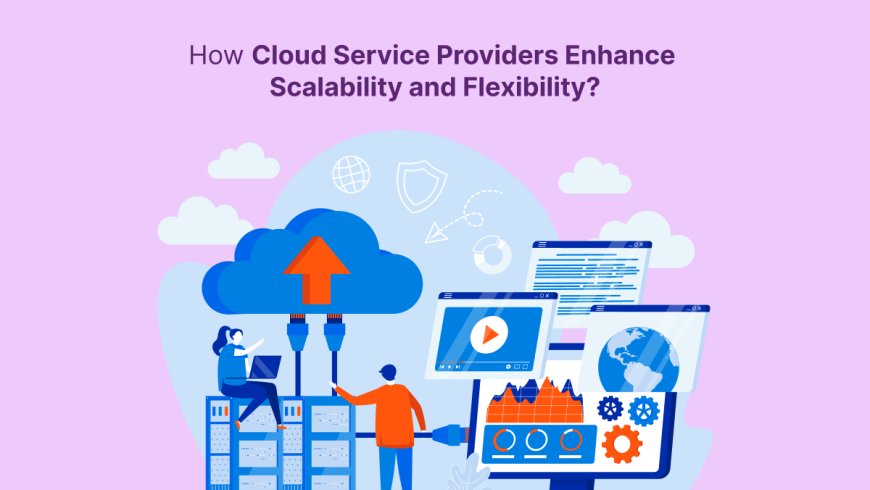How Cloud Service Providers Enhance Scalability and Flexibility?
Discover how cloud service providers enhance scalability and flexibility by offering on-demand resources, cost efficiency, and seamless infrastructure management.

In todays fast-changing digital world, businesses are always looking for smarter ways to grow without being held back by outdated systems or limited resources. Whether its a startup launching a new app or a big company managing tons of data, flexibility and scalability are key to staying ahead. Thats where cloud service providers step in.
Cloud service providers offer more than just online storage. They provide a powerful platform where businesses can build, run, and manage their applications without needing to worry about physical servers, hardware maintenance, or fixed capacity limits. With the help of cloud technology, companies can expand their services quickly, respond to customer demands faster, and only pay for what they use.
In this blog, well explore how cloud service providers enhance scalability and flexibility, why it matters for businesses of all sizes, and how you can make the most out of these solutions.
What Are Cloud Service Providers?
Understanding Cloud Services
Cloud service providers (CSPs) are companies that offer computing services over the internet. These services can include storage, processing power, networking, databases, software, and more. Popular cloud providers include Amazon Web Services (AWS), Microsoft Azure, and Google Cloud Platform (GCP).
Instead of buying and maintaining your own IT infrastructure, cloud services allow you to use shared resources in data centers owned and managed by the provider. You can access these resources anytime, from anywhere, and scale them up or down depending on your needs.
Types of Cloud Services
- Infrastructure as a Service (IaaS): Offers virtual servers, storage, and networking.
- Platform as a Service (PaaS): Provides a platform for developers to build and deploy applications.
- Software as a Service (SaaS): Delivers software applications over the internet on a subscription basis.
Each of these models offers different levels of control, flexibility, and management, but all aim to simplify operations and boost agility.
The Importance of Scalability in Business
What Does Scalability Mean?
Scalability refers to a system's ability to grow and handle increased demand without losing performance or reliability. For a business, this means being able to serve more customers, handle more data, or expand operations without having to rebuild the whole infrastructure from scratch.
Scalability is crucial in today's world where usage patterns can change overnight. Imagine launching an app that suddenly becomes viral. Without scalable infrastructure, your system could crash, and you might lose valuable customers.
Traditional vs. Cloud-Based Scaling
In traditional IT setups, scaling requires buying new servers, setting them up, and often dealing with lengthy downtime. This is costly and slow.
Cloud service providers, on the other hand, allow you to scale resources instantly. If you need more computing power or storage, its just a few clicks away. You can even automate the process so that your system scales automatically based on traffic or workload.
How Cloud Providers Enable Scalability
Elastic Resources
One of the biggest benefits of cloud platforms is elasticity. Elasticity means that the system can automatically adjust resources depending on demand. When traffic spikes, more resources are allocated. When demand drops, resources are scaled down to save costs.
This is especially useful for apps with unpredictable traffic or seasonal spikes, such as eCommerce platforms during holiday sales.
Pay-As-You-Go Model
Cloud services follow a pay-as-you-go pricing model. You only pay for what you use. This means businesses no longer have to invest heavily in infrastructure just to prepare for future growth. They can scale when needed and pay accordingly.
This model makes it easy for startups and small businesses to compete with larger companies without massive upfront investments.
Load Balancing
Cloud providers use load balancing to distribute workloads evenly across servers. This ensures no single server is overwhelmed, keeping applications running smoothly even during high-traffic periods. Load balancing also supports high availability, reducing the chances of downtime.
Global Reach
With data centers across the globe, cloud providers make it easy for businesses to serve customers in different regions. You can deploy your app in multiple locations to reduce latency and improve user experience, all while keeping everything centrally managed.
How Cloud Providers Offer Flexibility
Choice of Tools and Platforms
Cloud providers support a wide range of programming languages, frameworks, and development tools. This flexibility allows teams to use the tools they are most comfortable with, speeding up development and innovation.
Developers arent locked into one platform or environment. They can test new ideas, build prototypes, and deploy applications faster.
Easy Integration
Cloud platforms offer easy integration with third-party tools and APIs. Whether it's connecting to payment gateways, CRM systems, or analytics tools, cloud services make it easier to build an interconnected ecosystem that works for your business.
Hybrid and Multi-Cloud Options
Some businesses may want to keep certain data on-premises for security or regulatory reasons. Cloud providers support hybrid models where some resources are in the cloud while others remain on-site.
Additionally, companies can use services from multiple cloud providers to avoid being locked into one vendor. This multi-cloud approach increases resilience and offers more customization.
Remote Access and Collaboration
Cloud platforms allow team members to access systems and work from anywhere. This supports remote work, global collaboration, and real-time updates. Especially after the shift toward remote working, this flexibility has become a must-have for many companies.
Real-World Examples of Cloud Scalability and Flexibility
Example 1: Streaming Services
Streaming platforms like Netflix rely heavily on cloud infrastructure. During peak hours, they automatically scale up to handle millions of viewers. When traffic is low, they scale down to save costs all without manual intervention.
Example 2: Online Retailers
eCommerce platforms experience huge traffic during sales events. Cloud providers help these platforms manage sudden spikes without crashing. Inventory systems, payment processing, and customer support all run smoothly thanks to cloud scalability.
Example 3: Startups and MVPs
Startups often launch with minimal resources. Cloud services allow them to build, test, and scale their products without large investments. As their user base grows, they can upgrade services without having to migrate or redesign their architecture.
Read more:How a DevOps Solutions Provider Boosts Collaboration and Efficiency?
Key Cloud Services That Support Scalability and Flexibility
Auto-Scaling
This feature allows applications to automatically adjust capacity based on real-time needs. It helps maintain performance without wasting resources.
Serverless Computing
With serverless models like AWS Lambda or Azure Functions, developers dont need to manage servers at all. Code runs in response to events and scales automatically.
Containerization
Tools like Docker and Kubernetes allow applications to be deployed in containers. This makes them easier to scale, manage, and move between environments.
Cloud Storage Solutions
Cloud storage solutions are scalable by design. You can store as little or as much data as needed without worrying about physical limitations.
How Businesses Can Get Started
Evaluate Needs
Start by identifying what parts of your business can benefit from cloud scalability and flexibility. This could be customer-facing apps, internal tools, or data storage.
Choose the Right Cloud Provider
Pick a provider that offers the features, pricing, and support that align with your goals. Look into service-level agreements (SLAs), security policies, and available regions.
Plan for Growth
Design your applications with scalability in mind. Use modular architecture and rely on services like auto-scaling and managed databases to reduce future headaches.
Monitor and Optimize
Use built-in analytics and monitoring tools to track performance and costs. Make adjustments as your business evolves.
Conclusion
The ability to grow quickly and adapt to change is essential in todays digital economy. Cloud service providers give businesses the tools to scale up or down based on demand, add new features easily, and operate more efficiently. Whether you're managing user traffic, storing large volumes of data, or running complex applications, the flexibility and scalability of the cloud make it all possible without heavy investment or technical complications.
For businesses that rely on digital platformsespecially those offering mobile or web appsworking with a provider that understands these needs is vital. Partnering with an on demand app development services expert that integrates cloud solutions into your product strategy ensures your applications stay fast, available, and ready to grow at any moment.
FAQs
What makes cloud services more scalable than traditional infrastructure?
Cloud services allow you to instantly increase or decrease computing resources without buying physical hardware. This makes it much faster and more cost-effective than traditional infrastructure.
Can small businesses benefit from cloud scalability and flexibility?
Yes, cloud services are ideal for small businesses. They provide the power and flexibility of enterprise-level infrastructure at a price point that smaller companies can afford.
Is it possible to move existing apps to the cloud?
Yes, many businesses migrate their existing applications to the cloud to benefit from improved scalability, performance, and cost savings. Cloud service providers offer tools and support for smooth transitions.
How do cloud providers handle security while offering flexibility?
Most cloud providers offer built-in security tools, encryption, access controls, and compliance certifications. They also allow users to configure settings based on their specific security needs.
What happens if I no longer need certain cloud services?
One of the biggest advantages of cloud services is flexibility. You can scale down or terminate services you no longer need, which helps reduce costs and keeps your infrastructure lean.








































